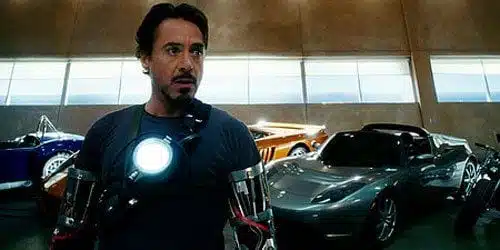
“I love peace.” So says Tony Stark (Robert Downey Jr.) at the start of Iron Man. A carousing, smug, unspeakably wealthy arms manufacturer, he’s riding in a hummvee with soldiers in body armor, extolling his celebrity and absorbing their admiration. The fact that he’s been demonstrating his latest product in a war zone (they’re on their way back to base in Afghanistan) only amplifies the self-righteous excitement. He can afford to love peace. He’s made billions off the line.
And then Tony Stark’s life changes. According to Jon Favreau’s lively, often charming, sometimes insightful summer blockbuster, this change is a function of circumstances. Forced to confront his own vulnerability and narrow worldview, Tony is able to see, at long last, that his life and his inherited company, Stark Industries, are premised on Old Paradigms. Where he once pronounced confidently, “Peace means carrying a bigger stick than the other guys,” and believed that his father’s way was the American way was the right way, once he can imagine his own death by his own weapons, well, he must rethink. And even if it’s inconceivable that Tony didn’t know his “Freedom Line” of weapons was circulating on the black market, the moment of his shock serves as useful allegory: gazing around an “insurgents’ camp” where he’s held hostage, everywhere a Stark Industry case of guns or mortars, he has a change of heart.
The new and improved Tony Stark is, of course, Iron Man. He undergoes several steps in this revisionist, essentially weaponized self. The first few are initiated by his sudden new knowledge of how the global arms trade works. And so Tony spends some months in a cave with a physician sidekick, Yensin (Shaun Toub), instructed by captors to devise a gigantic and all-destructive missile. It helps that Tony needs something that looks a lot like an artificial heart. This takes the wonderfully resonant form of a super-tech, wholly goofy gizmo that fits into a cavity smack in the middle of his chest and glows when it’s on. His first suit is rudimentary and apparently actually made of iron, a bullets-deflecting, turbo-charged, slamming-and-bamming crazy costume that lets him commit mayhem, mostly with impunity. It’s exhilarating to watch him beat back the cave-dwelling, puny-guns-toting villains, even if the visuals replay the sort of East vs. West scenario that Tony has ostensibly seen through and rejected.
On returning home to Malibu, Tony is accosted by the tabloid-inclined press, as well as his longtime business partner Obadiah Stane (Jeff Bridges). Stunned when Tony announces his intention to retool the company so it no longer makes weapons, he goes along, as do his loyal and beautiful assistant Pepper Potts (Gwyneth Paltrow) and his buddy Rhodey (Terrence Howard, not on screen nearly often enough). Tony puts on a bit of a show and then, seeing that his friends are worried, retreats. In the garage with his sports cars and massive computers, he sets about re-conjuring his Iron Man suit and identity with the help of robots he anthropomorphizes with all due wit. This R&D phase is aptly entertaining, with comic mishaps and directions barked at the robot assigned to zap him with a fire extinguisher should he catch fire: Downey makes all this solo performing quite fun; he appears at least as self-aware as Michael Keaton did as Batman, his childlike awe at his own genius disarming and delightful.
For all Tony’s new understanding of “peace,” the fact that Iron Man is in fact a weapon allows the film to do a few things that summer movies must do: it provides for all manner of clanking and bashing, zooming, shooting, and exploding. But unlike the Transformers, this loud and raucous whiz-bang of an effect insists on the “heart” inside it. On one level, the heart angle is upfront sentimental (see Pepper’s infinite patience and tentative sensuality, especially Paltrow in a backless gown, unbearably sweet and silent). Tony’s efforts to make it right with her after years of cavorting with calendar models and reporters are tedious (if vaguely ironic, in Downey’s version of this utterly predictable plot point), but her delicacy is dated. The inevitable franchise will have to grant her something like a new heart as well.
On another level, the heart business is also political. Not in a way that would scare off viewers (heavens, no!) but in a way that makes a point. Tony makes clear enough that he regrets his lies and especially, his use of language as cover-up (see: Operation Enduring Freedom, The War on Terror), that he recognizes the devastating results of invasion and combat. The movie doesn’t hammer this point, but it does try to integrate the particular problems posed by U.S. war-making and weapons manufacturing into its critique of business as usual. This Iron Man is surely facing different enemies than the one who first appeared in 1963, but the fundamental dilemma of war as perpetual industry is still mostly just observed here, not fundamentally challenged or reframed.
That doesn’t mean he doesn’t engage; he’s a weapon, after all. When Iron Man makes a brief trip to Afghanistan in order to protect refugees from his primary nemesis, the bald, mad, and badly scarred Raza (Faran Tahir), the film is plainly stuck: the white-guy-machine saves the defenseless, impoverished, scrabbling victims against a man-monster who looks like them. It’s hardly surprising, but it is disappointing. The clever vitality Downey provides is mostly squandered during such compulsory plotting, when Tony become an effect more regular than special.

